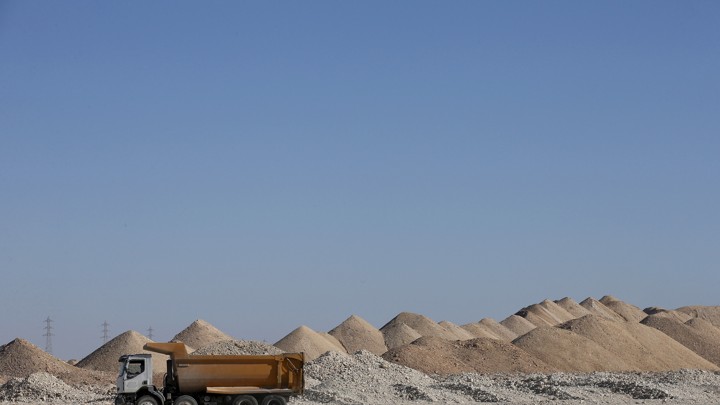Stop Western Sahara plunder, Jacinda

New Zealand Prime Minister Jacinda Ardern spoke of human rights and international cooperation at the United Nations. But what will she do about the fact that two New Zealand companies are the last buyers of phosphate rock from occupied Western Sahara?
New Zealand’s Prime Minister Jacinda Ardern attracted a lot of media attention at the United Nations General Assembly in New York in September.
Both because she brought her baby with her, because she is the youngest female world leader ever, and because the speech she gave, with its focus on human rights and international cooperation, was seen as an antidote to United States President Trump’s isolationist rhetoric.
Radio New Zealand even referred to a global “Jacindamania” that had her charm the audience on the “Late Show with Stephen Colbert”.The New York Timescalled her “the biggest thing to hit here since Frodo dropped the ring in Mount Doom”.
Human rights for everybody
At the UN, Jacinda Ardern spoke of the importance of human rights. “Governments do have obligations to their people and each other … our actions have a global effect”, and “everyone is entitled to have their dignity and human rights respected”, she said.
But Ravensdown and Balance Agri-Nutrients, two New Zealand farmer-owned cooperatives, will be the last foreign companies to buy phosphate rock from the Moroccan occupiers in Western Sahara when US and Canadian companies stop their imports at the end of the year, due to concerns that the trade is in violation of international law.
Imports that, according to international network Western Sahara Resource Watch (WSRW), are valued at over US$ 250 million and play an important part in the profitability of Morocco’s occupation of Western Sahara.
Knows and speaks of Western Sahara
And even though the Western Sahara conflict, where Morocco has occupied a country rich in fish, phosphates and other minerals since 1975, does not get much media coverage, Jacinda Ardern is well aware of the nature of the conflict.
As President of the International Union of Socialist Youth in 2008, she visited the refugee camps in neighbouring Algeria where a majority of Western Sahara’s people, the Saharawis, have lived since the Moroccan army drove them out of Western Sahara in 1975.
She has mentioned Western Sahara in several speeches, as recently as 24 September 2018 in New York, where she spoke of how “my visits to [the Saharawi] refugee camps … left a lasting impression on me”. She also mentioned Western Sahara in her maiden speech in parliament in 2008.
In mid-September, she was reminded of the issue by the Western Sahara liberation movement Polisario, who urged “New Zealanders and their representatives to act now to end the crime committed against our people by Kiwi companies”.
“We particularly appeal to [Ardern] to make this issue a priority during her term of office”, Polisario representative Kamal Fadel said.
Walk the walk
The New Zealand Minister of Agriculture, Damien O’Connor, replied in a letter to WSRW that New Zealand’s Ministry of Foreign Affairs “has consistently made clear to those companies importing phosphate rock from Western Sahara that they must comply with international law, and that they import the product under their own responsibility”.
No clarification is made as to what international law says in regard to the matter of trading with a colonial power, or whether this has been referred to the companies. And none of the companies have, according to WSRW, properly described why their purchases of phosphates are in accordance with international law.
“The companies in question do not seem to recognise that Morocco has no right to be in the territory”, says WSRW.
In actual fact, the people of Western Sahara have to give their consent to any sales of natural resources from their country by Morocco for any deal to be in line with international law, something that they have never done.
Learn from Mandela
At the Nelson Mandela Peace Summit three days before her UN Speech, Jacinda Ardern spoke of Mandela being a “living embodiment of the United Nations’ values” and that “we must ensure that the just, peaceful, prosperous, democratic, fair and inclusive world which Mandela strived for is fully realised”.
So perhaps she should look to South Africa for further guidance in regard to Western Sahara.
In 1988, during a meeting with Polisario, African National Congress Secretary General Oliver Tambo spoke of the “the similarity of the nature of the struggle of the Sahrawi people and the people of South Africa”. Post-apartheid, the South African government has reiterated its support for the Saharawis on several occasions, including the present administration.
And last year, the South African authorities stopped a ship with 55.000 tons of phosphate rock on its way from Western Sahara to New Zealand. The South African courts ruled that the phosphates belonged to Western Sahara’s people, the Saharawis, not the Moroccan occupying power, and handed the cargo over to Polisario.
The illegality of Morocco’s presence in Western Sahara has been maintained by the UN Security Council and the UN General Assembly in over 100 resolutions, especially UN General Assembly resolution 1514 that states that “all peoples have the right to self-determination; by virtue of that right they freely determine their political status and freely pursue their economic, social and cultural development”. Resolution 1514 was declared applicable to the case of Western Sahara by UN General Assembly Resolution 2229.
Self-determination of nations such as Western Sahara, including their natural resources, was recognised as a principle in article 1, paragraph 2, of the International Covenant on Economic, Social and Cultural Rights that reads “All peoples may, for their own ends, freely dispose of their natural wealth and resources … based upon the principle of … international law. In no case may a people be deprived of its own means of subsistence”.
* Peter Kenworthy is a freelance journalist
